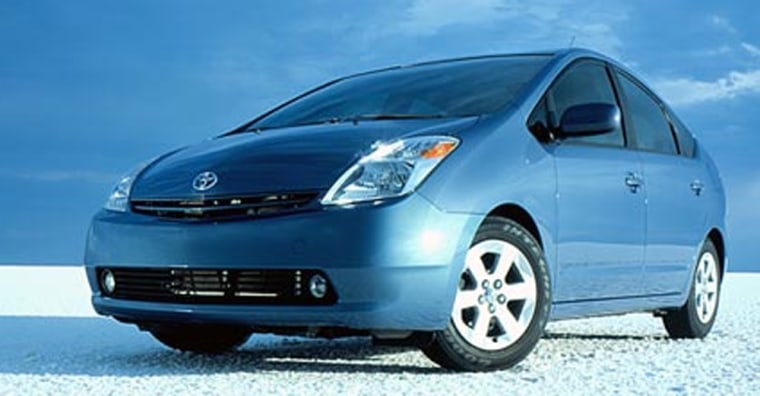U.S. sales of hybrid and diesel vehicles will likely more than double in the next seven years, cornering up to 11 percent of the market on the back of rising gasoline prices, industry researchers predicted in a study released Tuesday.
Gas-electric hybrid vehicles, which accounted for 0.5 percent of the U.S. market in 2004, are expected to increase to 3.5 percent market share by 2012, while diesels are expected to grow from 3 percent market share in 2004 to 7.5 percent, according to the study released by J.D. Power-LMC Automotive Forecasting Services.
It estimates hybrid and diesel vehicles will account for 4.8 percent of the total U.S. market this year.
U.S. sales of fuel-sipping hybrid vehicles have grown rapidly over the past few years as high oil prices have cast a spotlight on fuel saving technology.
'Dramatic growth'
“Higher gas prices are acting as a catalyst for automakers and consumers to find alternatives to the traditional gasoline internal combustion engine,” Anthony Pratt, senior manager of global powertrain forecasting at the group, said in a statement. "We anticipate this will lead to dramatic growth, particularly with diesels, over the next several years."
Hybrid vehicles twin a regular gasoline engine with an electric motor and battery in which the act of braking captures lost energy, enabling vehicles to save fuel and emit fewer pollutants.
Japan’s Toyota Motor Corp., which sells the popular Prius hybrid car and a hybrid Lexus SUV, is a world leader in the technology along with Honda Motor Co. Ltd., which sells the Insight and hybrid versions of its Civic and Accord cars.
Detroit’s Ford Motor Co. last year became the first automaker to sell a hybrid SUV, while General Motors Corp. is also aiming to introduce the technology on its bigger vehicles.
44 hybrid models by 2012?
The study estimates that the number of hybrid vehicle models on the market will increase from 10 in 2005 to 44 by 2012, while the number of diesel models is expected to grow from 14 to 26.
“The bulk of the growth in hybrid models will be in SUVs and mid-size cars,” Pratt said. “The bloom of diesel vehicles will be in the pickup truck segment, as well as the luxury car and SUV segments.”
The study added, however, that continued strong growth is predicated on industry bringing down the higher costs of hybrid and diesel engines, which now can cost $3,000 to $5,000 more than a gasoline sibling.
Diesel also has to meet stricter air standards starting in 2007.
"Outside of meeting future emission standards," Pratt said, "the biggest challenge for automakers concerning diesel technology will be convincing consumers that today’s diesel engines have increased performance and run cleaner and quieter than previous-generation diesels."
